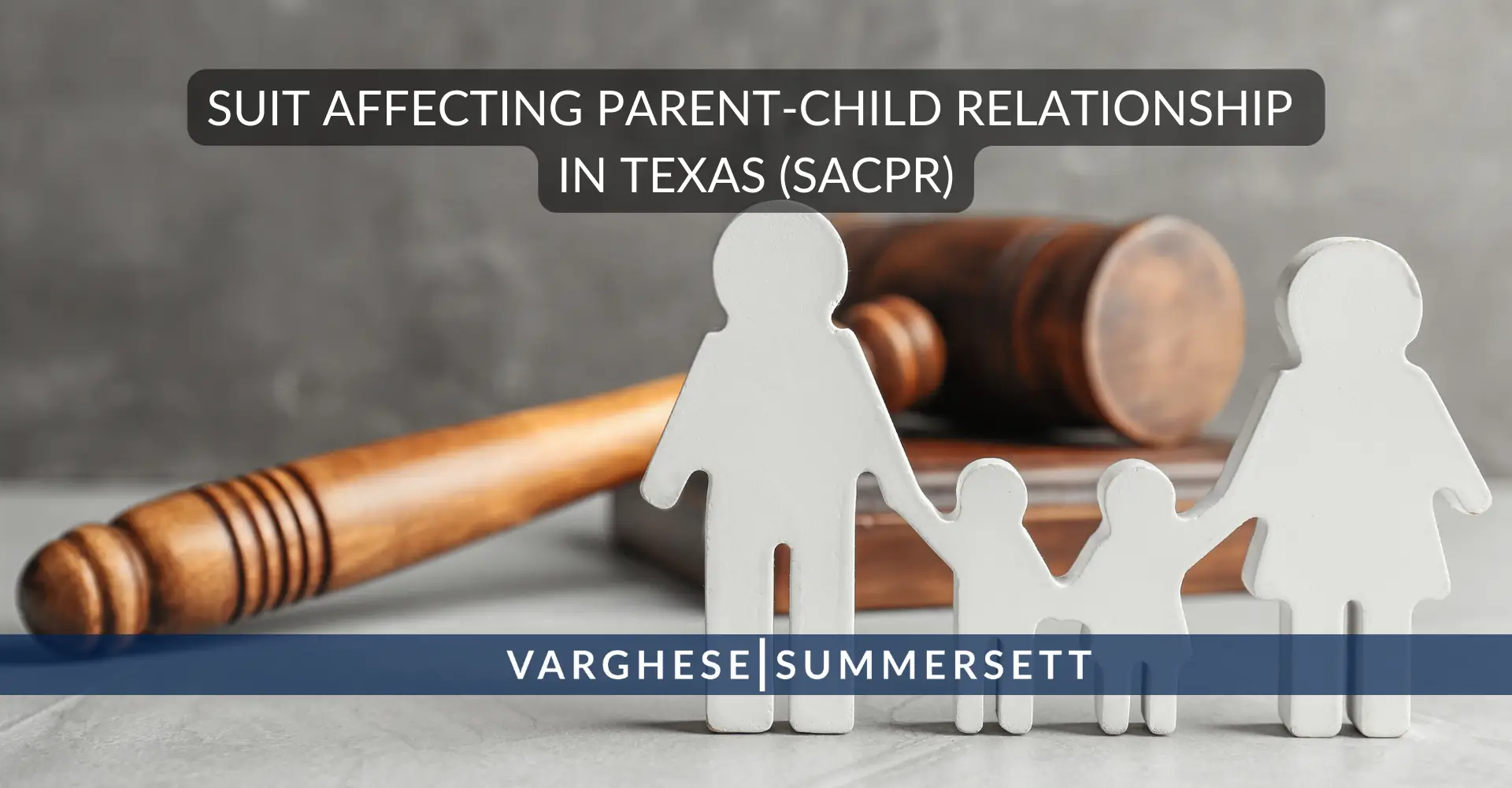
What is a SAPCR in Texas? Suit Affecting Parent Child Relationship
What is a SAPCR in Texas?
In Texas family courts, you will often hear attorneys refer to a SAPCR (pronounced “Sap-sir), which is an acronym for a Suit Affecting the Parent-Child Relationship. A SAPCR is a legal request, or petition, filed in family court asking a judge to make orders about visitation, child support, child custody, and medical support for a child.
SAPCRs are quite common in Texas family law courts, especially in cases where parents are not married and need to address issues related to their children. SAPCRs are essential for establishing and protecting the rights and responsibilities of parents and children in situations where there is no existing court order.
In this article, our experienced Fort Worth family law attorneys will explain a suit affecting the parent-child relationship in Texas and answer some frequently asked questions.

Standing to File a Suit Affecting the Parent-Child Relationship in Texas
While unmarried parents are the most common parties to file a SAPCR, they are not the only ones who can do so. Other individuals who have a significant relationship with the child or a legal interest in the child’s welfare may also have standing to file a SAPCR under specific circumstances. Under Section 102.003 of the Texas Family Code, the following parties have standing to file a SAPCR:
- A biological or adoptive parent of the child;
- A prospective adoptive parent;
- A person, other than a foster parent, who has had actual care, control, and possession of the child for at least six months, ending not more than 90 days preceding the filing of the petition;
- A person designated as the managing conservator in a revoked or unrevoked affidavit of voluntary relinquishment of parental rights;
- A person with a court-ordered right of possession of or access to the child;
- A person who is a party in a pending suit for the dissolution of a marriage with the child’s parent;
- A person who has lived with the child and the child’s parent, guardian, or conservator for at least six months prior to filing the SAPCR and the child’s parent, guardian, or conservator has died;
- The child’s grandparent, great-grandparent, sister, brother, aunt, uncle, niece, or nephew if both parents are dead; or both parents, the surviving parent, or managing conservator agree; or the child’s present circumstances will harm his or her physical or emotional health;
- A person who served as the foster parent of the child for at least a year prior to filing the SAPCR.
The SAPCR Process in Texas
The Suit Affecting the Parent-Child Relationship (SAPCR) process in Texas is a legal procedure that addresses issues related to the rights and responsibilities of parents and the welfare of their children. This process can involve matters such as child custody, visitation, child support, and other aspects of parenting. Here is an overview of the SAPCR process in Texas, starting from the filing of the case to the final decision by a judge:
Filing the Case
The SAPCR process begins when a party (the petitioner) files a petition with the appropriate district court. The petition must contain information regarding the parties involved, the children, and the desired outcomes related to custody, visitation, and support. The petitioner must pay the required filing fees and serve the other party (the respondent) with the petition and a citation, notifying them of the legal action.
Responding to the Petition
The respondent has a specific time frame (usually 20 days after receiving the citation) to file a written answer with the court. The answer can either agree with or contest the petitioner’s requests. If the respondent fails to file an answer within the time limit, the court may grant a default judgment in favor of the petitioner.
Temporary Orders
In some cases, temporary orders may be necessary to address immediate issues, such as temporary custody, visitation, and child support. These orders remain in effect until the final court order is issued or the case is dismissed.
Discovery Process
Both parties can request information and documents from each other through the discovery process. This can include interrogatories, requests for production, and depositions. The purpose of discovery is to gather evidence and establish the facts of the case.
Mediation or Settlement Negotiations
Before proceeding to trial, the parties may attempt to resolve the issues through mediation or settlement negotiations. A neutral third party, known as a mediator, may facilitate discussions and help the parties reach an agreement. If an agreement is reached, it is submitted to the court for approval.
Trial
If the parties cannot reach an agreement, the case proceeds to trial. During the trial, both parties present evidence and arguments to support their positions. Witnesses may be called to testify, and each party has the opportunity to cross-examine the other’s witnesses. The judge may also appoint experts, such as child custody evaluators, to provide additional information and recommendations.
Final Decision
After considering the evidence and arguments, the judge will issue a final order, which outlines the rights and responsibilities of each parent regarding custody, visitation, and child support.
Post-Judgment Actions
Once the final order is issued, the parties must comply with its terms. If either party wishes to modify or enforce the order, they must file the appropriate motion with the court.
It is important to note that each SAPCR case is unique, and the specific steps and timeline may vary depending on the circumstances. It is highly recommended that parties involved in a SAPCR consult with an experienced family law attorney to ensure they understand their rights and responsibilities under Texas law.
Issues Addressed in a SAPCR: Role of the Court
The court’s primary role in a SAPCR is to determine the best interests of the child when making decisions regarding conservatorship, possession and access, and child support. The court will consider various factors, such as the child’s needs, the parents’ abilities, and the stability of each parent’s home environment, to reach a fair and just outcome for all parties involved. Here’s an overview of the role the court plays in a SAPCR:
Establishing Conservatorship
The court decides whether the parents will be joint managing conservators, sole managing conservator, or possessory conservator. This determination involves assigning parental rights and responsibilities, such as decision-making authority for the child’s education, healthcare, and other aspects of the child’s life.
Determining Custody and Visitation
The court establishes a possession and access schedule, which outlines the time the child will spend with each parent. This schedule is designed to ensure that the child maintains a healthy relationship with both parents while considering factors such as the child’s needs, the parents’ schedules, and the geographical distance between the parents’ residences.
Ordering Child Support
The court determines the appropriate amount of child support one parent should pay to the other to contribute to the child’s financial needs. This calculation typically follows Texas child support guidelines, which take into account factors such as the parents’ incomes, the child’s needs, and the number of children involved.
Ensuring the Best Interests of the Child
Throughout the entire SAPCR process, the court’s primary objective is to protect the best interests of the child. This involves considering various factors, such as the child’s emotional and physical needs, the stability of each parent’s home, and the parents’ ability to cooperate and make decisions together.
Enforcing and Modifying a Court Order
After issuing the final order in a SAPCR, the court has the authority to enforce its terms and modify them if necessary. For example, if a parent fails to comply with the custody or support order, the court can take action to enforce compliance. Similarly, if there is a significant change in circumstances that affects the child’s best interests, the court may modify the order to reflect the new situation.
In summary, the court’s role in a SAPCR is to oversee the legal process, make decisions about conservatorship, custody, visitation, and child support, and ensure that the best interests of the child are the primary consideration in all decisions affecting the parent-child relationship.
Rights & Duties in a SAPCR
Parental rights in a Suit Affecting Parent-Child Relationship can be divided in a number of ways. Senior Associate Kristen Carr explains in this video.
Difference between a SAPCR and a Divorce
A divorce legally dissolves a marriage, while a SAPCR focuses solely on child-related issues such as custody, visitation, and child support. A SAPCR can be part of a divorce case, or it can be a separate proceeding if the parents were never married or wish to address child-related issues without ending their marriage.
A SAPCR only pertains to children. The court will not take up any other issues, including the division of property or spousal support. The court’s primary focus is making decisions that will benefit the child and preserve the parent-child relationship. By contrast, a divorce involves multiple issues that are all addressed in one proceeding.
Difference Between a Petition to Adjudicate Parentage and a Suit Affecting the Parent-Child Relationship (SAPCR)
A “Petition to Adjudicate Parentage” and a “Suit Affecting the Parent-Child Relationship (SAPCR)” are two different legal processes in family law that address different aspects of the parent-child relationship.
Petition to Adjudicate Parentage
A Petition to Adjudicate Parentage is a legal action filed to establish the legal parentage of a child, usually when the parentage is in question or dispute. This type of petition is often filed by a presumed or alleged father, a mother, or even a child, to confirm or challenge the biological and legal relationship between the parent and the child.
In a Petition to Adjudicate Parentage, the court will determine the child’s legal parents, usually through DNA testing or other evidence. Once the parentage is established, the court can make decisions about child support, custody, and visitation rights. Establishing parentage is crucial because it creates legal rights and responsibilities for both the child and the parents.
Suit Affecting the Parent-Child Relationship (SAPCR)
A Suit Affecting the Parent-Child Relationship (SAPCR) is a broader legal action that addresses various aspects of the parent-child relationship, such as custody, visitation, child support, and other parental rights and responsibilities. A SAPCR can be initiated by a parent, a guardian, or even a government agency.
In a SAPCR, the court’s primary concern is the best interest of the child. The court will consider various factors, such as the child’s needs, the parents’ abilities to provide for those needs, and the existing relationships between the child and the parents, to make decisions regarding custody, visitation, and support.
In summary, a Petition to Adjudicate Parentage focuses specifically on establishing the legal parentage of a child, while a SAPCR addresses a wider range of issues related to the parent-child relationship, including custody, visitation, and child support. Both legal processes aim to protect the best interests of the child and ensure that the child’s needs are met.
Difference Between a SAPCR and Child Custody Modification
A SAPCR is a legal action to establish or modify the rights and responsibilities of parents and children, including conservatorship, possession, access, and child support. A child custody modification, on the other hand, is a specific type of SAPCR that seeks to change an existing custody or visitation order. Modifications are typically requested when there has been a significant and material change in circumstances or when the modification is in the best interests of the child. This can include changes in the child’s needs, a parent’s living or financial situation, or other factors that affect the child’s well-being.
If you’ve already gone through a SAPCR or a divorce with child-related issues, and you believe that the current arrangements are no longer in your child’s best interest, you may be able to file for a custody modification. An experienced family law attorney at Varghese Summersett Family Law Group can help.

Need to file SAPCR? Served with SAPCR? Contact Us.
Are you considering filing a Suit Affecting the Parent-Child Relationship (SAPCR) in Tarrant County? Have you recently been served with a SAPCR? Don’t navigate these complex legal matters involving your children alone. Contact us today for expert guidance and support.
Our experienced Fort Worth family law attorneys understand all aspects of SAPCRs and can help you through every step of the process. Whether you’re seeking to establish custody, visitation, child support, or modify an existing order, we’re here to ensure the best possible outcome for you and your child. Call Varghese Summersett Family Law Group today at (817) 900-3220 to schedule a consultation.



